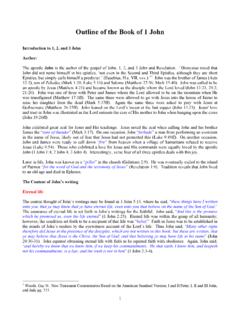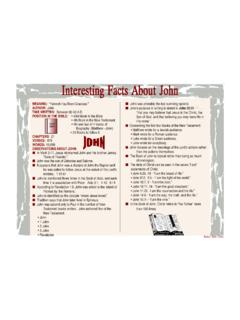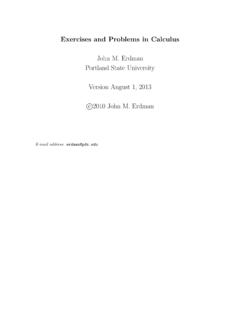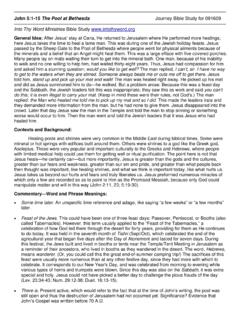Transcription of John 5:1-15 Sermon or Lesson - Witness Today
1 Sermon or Lesson : john 5:1-15 (NIV based). [ Lesson Questions included]. TITLE: Do you want to get well? . ---------------------------------------- ---------------------------------------- ----------------------------- NOTE #1: The recommendation for this Sermon or Lesson in NIV is to add the use of the New American Standard version (NAS) for verses 3c-4 because it correctly denotes in brackets [ ] that the word phrases in the last part of v. 3 and all of are not present in early manuscripts (Unger 164), and therefore are suspect of not being in the original Greek text. The NIV omits these suspect phrases in verses 3c-4 altogether. But upon studying this passage, however, the evidence and descriptions in the rest of the passage do reasonably support these suspect word phrases, and are the only logical explanation for the content of the invalid's reply in and for why these sick people are congregated around the pool.
2 So, for those who preach or teach this passage, the recommendation is to exercise care by representing and holding these word phrases as being suspect but reasonable, given the context in this passage. NOTE #2: The focus of this Sermon will be on the dynamics pertaining to the healing, and will not address the Sabbath issues in this passage. ---------------------------------------- ---------------------------------------- ----------------------------- INTRO: How weird would it be if a disabled person in a wheelchair for 38 years went to the doctor, who promptly asked Do you want to get well? ? Is that a question you would expect? Is it reasonable or is it bizarre? Well, Jesus asked this very question in this kind of situation. Let's study the passage to see what we can learn about Jesus asking this seemingly bizarre question. ---------------------------------------- ---------------------------------------- ----------------------------- READ: john 5:1-3b NIV, with in the NAS, then in the NIV.
3 [ Lesson Question: What is the setting of this situation?]. SECTION POINT: Jesus initiates a conversation with one disabled man among numerous other disabled persons congregated around a pool. The setting of this situation is: - - Jesus goes to the pool of Bethesda in Jerusalem, where there lay a multitude of those who were sick, blind, lame, and withered ( ). - - Apparently these disabled people were wanting to be the first person into the water after an angel stirred it, and as such would be healed. (NAS). - - Jesus sees a man there who had been an invalid for 38 years, and starts a conversation with the man - suggesting Jesus had special concern for this disabled man. invalid = Strong's #0769 feebleness (of mind or body); by implication, malady; morally, frailty . ---------------------------------------- ---------------------------------------- ----------------------------- READ: john 5:6 NIV.
4 [ Lesson Question: How would you evaluate this question from Jesus in verse 6, given the circumstances of this situation?]. SECTION POINT: Given the circumstances of this situation, Jesus asks a seemingly very bizarre question of Do you want to get well? . - - Jesus asks the disabled man, Do you want to get well? . - - This seems like an extremely odd, or bizarre, or even ridiculous question to be asking someone who has been disabled for 38 years. - - But Jesus was being polite, not forcing Himself or His agenda on the man. - - Jesus has the power to instantaneously heal the man but seeks permission before intervening in an unexpected helping way. - - Additionally, Jesus gets the disabled man to verbalize his situation - suggesting compassion for this man, interest in his plight, and willingness to take the time to listen to what this man had to say.
5 ---------------------------------------- ---------------------------------------- ----------------------------- READ: john 5:7-9a NIV. [ Lesson Question: What are the implications of Jesus' words that He spoke as He healed the disabled man?]. SECTION POINT: Jesus instituted a fully-restorative healing, being simultaneously represented in both verbal and miracle forms. - - The disabled man apparently had a significant mobility problem, needing someone to pick him up and put him into the pool. Jesus validates the man's reason why he cannot get into the pool first by then instantly healing the man with a 3-part verbal command: - - arise or get up - suggesting restored usage of his arms and legs;. - - take up your pallet or mat he was laying on - suggesting restored flexibility and strength;. - - and walk - suggesting restored balance and coordination;. - - a complete healing with full restoration of strength and functioning.
6 ---------------------------------------- ---------------------------------------- ----------------------------- READ: john 5:9b-13 NIV. [ Lesson Question: Why did Jesus slip into the crowd ( )? To avoid recognition? Or all of the other invalids would want to be healed too, and perhaps start a ruckus or riot? Why would Jesus not be willing to heal all of them as well and at once?]. SECTION POINT: Apparently, Jesus selectively healed just this one disabled man while refraining from healing all the other disabled persons present because He had specific purposes to accomplish that went beyond merely healing disabled persons. - - It seems odd that Jesus slipped away and did not heal all the others there. - - By implication according to this account, Jesus deliberately walked past all the other disabled people around the pool without healing any of them. - - Apparently, Jesus had specific purposes to accomplish through the healing of just this one man.
7 - - And also apparently, Jesus had no intention of healing anyone else there. - - Therefore, Jesus' purposes in this situation went beyond merely healing disabled persons with a variety of ailments. ---------------------------------------- ---------------------------------------- ----------------------------- READ: john 5:14-15 NIV. [ Lesson Question: Why does Jesus talk with the man again later?]. SECTION POINT: Jesus advises and warns the man that his sin was the source cause for his previous disability, and disability could return upon him even worse if the man re- engages in sinning again. - - Later Jesus found the man at the temple - suggesting Jesus had further reason to look for the man. - - Jesus approaches the man and tells him more - suggesting Jesus had further concern and instruction for him. - - Possibly, Jesus slipped away ( ) from the crowd at the pool because He had some things He wanted to privately say to the man.
8 - - Jesus greets the man with a somewhat pronounced exclamation behold or see (Strong's #2396) connected to the declaration you have become well - suggesting that Jesus is accentuating a point He is about to make. - - Jesus sought the man out to warn him - suggesting Jesus was concerned about the man's ongoing well-being, both physically and spiritually. - - Jesus warns, advises, exhorts, and instructs the man to do not sin anymore, so that nothing worse may befall you . - - Jesus is declaring that the man's sin caused his physical infirmities. - - Exactly what kind of sin that was is not indicated here, but the implication is that the sin was significant. - - Jesus is cautioning that if the man continues to sin, the sickness may return and be worse next time. - - Therefore, Jesus essentially both exhorted and threatened the man to repent or else you will get it worse'.
9 - - And logically, one purpose for Jesus selectively healing just one disabled person among many was to accentuate the principle that God can and does inflict people with illness if they are sinning. ---------------------------------------- ---------------------------------------- ----------------------------- IMPLICATIONS: - - Sin has consequences intentionally enacted by God. ( ; cf. Romans 3:23, 6:23, 1:27). - - Sin can be the reason for some instances of illness. ( ; cf. James 5:14-16; john 9:1-3). - - God can bring illness upon us as discipline because of our sin. ( ; cf. Ephesians 6:1- 3). - - The Lord will let us reap what we sow - even if it means prolonged debilitating suffering. (cf. Galatians 6:7-8). - - Like this man, most people and believers do not realize that their sin may be the source of their illness. - - When informed, some people do not want to get well because they do not want to stop sinning; apparently they want the gratification their sin gives them more than they want their well-being.
10 - - Some of them love their misery, self-pity, drawing attention to themselves, controlling others through their disabilities, inciting others to serve them. - - They would much rather hang on to their illness than to draw close to the Lord and let Him heal them! - - When we understand the true nature of this man's problem, Jesus' question is quite appropriate rather than being bizarre or ridiculous. - - The Lord wants to bless us if we would repent and be willing to change our behaviors, thinking, etc. - - Theoretically then, we should want God to confront and convict us of our sin areas. ---------------------------------------- ---------------------------------------- ----------------------------- BIG IDEA: The Lord wants to bless you with good health but He may bring illness upon you as discipline if you are sinning. ---------------------------------------- ---------------------------------------- ----------------------------- APPLICATIONS: - - Do you (or a loved one) have some kind of illness, such as a physical, psychological, emotional, or medical condition that was not caused by a physical accident?






